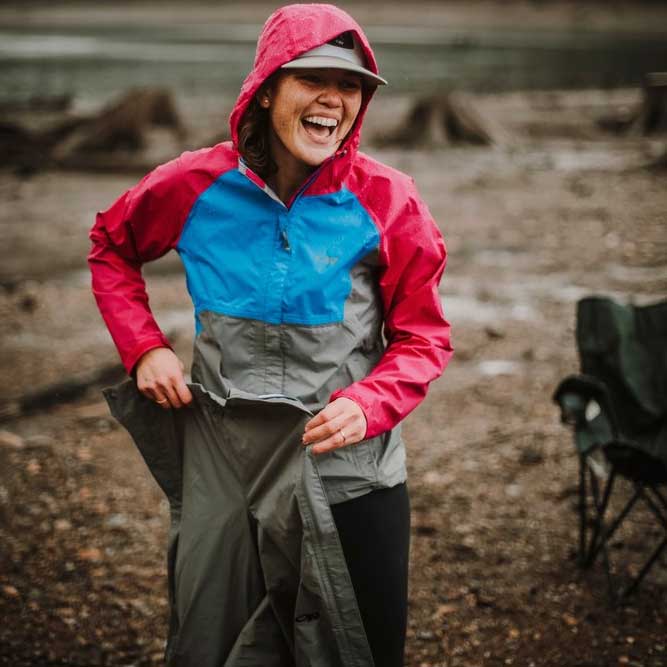Understanding Waterproof & Breathable Membranes
Waterproofing is simple: if water on the outside of the garment/shoes/tent doesn't get inside, the thing is waterproof, right? Well, yes and no. There are degrees of waterproofness in outdoor clothing, and here's why.
We all know that waterproof garments are nothing without their breathability. After all, a black bin bag is waterproof but you wouldn't wear one hiking as you'd sweat like a sumo wrestler taking a spinning class in the jungles of Borneo. So what is this mystical breathability and from whence does it come?
Simply put, a waterproof/breathable membrane is a very thin layer of expanded polytetrafluoroethylene (PTFE), a synthetic polymer (i.e. a plastic sheet) containing holes that are too small for water molecules to pass through yet large enough to allow water vapour to pass through. So, the raindrops can't get in but the evaporated sweat coming off your hard-working body can get out. Getting the size of the holes perfect to maximise both operations is tricky, plus expensive. Generally, the more breathable a fully waterproof membrane is, the more expensive it will be to produce.

Measuring Waterproofness
Hydrostatic head, measured in millimeters (mm), is a measure of how waterproof a fabric is. In the case of a 10k or 10,000 mm fabric, if you put a cylinder with inner dimensions of 1” x 1” over a piece of said fabric, you could fill it with water to a height of 10,000 mm (10m) before water would begin to leak through. The higher the number, or 'water column', the more waterproof the fabric.
|
Hydrostatic Head (mm) |
Water Resistance |
Usable Conditions |
|
0-5,000 mm |
Some resistance to moisture |
Light rain and snow with little wind around |
|
6,000-10,000 mm |
Waterproof under mild conditions |
Light rain and snow with little wind around |
|
11,000-15,000 mm |
Waterproof under normal "bad weather" conditions |
Standard, snow and wind conditions |
|
16,000-20,000 mm |
Waterproof under high pressure conditions |
Heavy rain and wet snow with high winds |
|
20,000 mm+ |
Waterproof under very high pressure conditions |
Extreme rain and snow conditions in high winds including high alpine |
Measuring Breathability
Breathability is normally expressed in terms of how many grams (g) of water vapor can pass through a square meter (m2) of the fabric from the inside to the outside in a 24 hour period. In the case of a 20k (20,000 g/m2) fabric, this would be 20,000 grams of moisture transfer. The larger the number, the more breathable the fabric. Simple.
Except that this figure is only for the membrane, not the finished article. The construction of the jacket will also have an effect. In a three layer jacket (3L), the membrane (the middle layer) is bonded to the outer face fabric and a protective internal woven layer. In a 2.5 layer jacket the woven layer is replaced by a screen printed 'half' layer to protect the membrane. This is a lighter solution but doesn't protect the membrane as well and also doesn't have such a nice feeling against the skin, often being described as 'clammy'. Generally three layer garments are more breathable.
The last thing to consider is DWR, or Durable Water Repellency, the chemical treatment that is applied to the outside of waterproof garments to make water bead up and roll off. This treatment wears off over time and although its disappearance in no way affects the performance of the membrane, without it rain will sink into the face fabric and significantly impair the breathability of the garment. Therefore in order to maximise the breathability of your jacket you should wash it in special soft detergent to maintain the DWR and reproof it regularly.
Now that you know what's going on, the following table lists some common membrane brands that you may come across in Australia, along with their waterproof and breathability ratings. Hopefully this will give you an idea of what to look for next time you are replacing a jacket, pants or boots.
|
Brand |
Waterproofness (mm) |
Breathability (g/m²/24hr) |
|
MONT Hydronaut / Pro 3L |
30,000 |
>20,000 / 28,000 |
|
eVENT 3L |
30,000 |
>20,000 |
|
GORE-TEX Active 3L |
>28, 000 |
>25,000 |
|
GORE-TEX Pro 3L |
>28,000 |
25,000 |
|
GORE-TEX C-Knit 3L |
>28,000 |
>20,000 |
|
GORE – TEX 3L |
>28, 000 |
17,000 |
|
GORE-TEX Paclite 2.5L |
>28,000 |
15,000 |
|
PERTEX Shield+ 2.5L |
20,000 |
20,000 |
|
Salomon Advance Skin Dry |
10,000 |
10, 000 |
|
Ventia 2.5L |
10,000 |
10,000 |
|
Pertex Endurance |
1,000 |
7,000 |
Written by: Dan Slater

